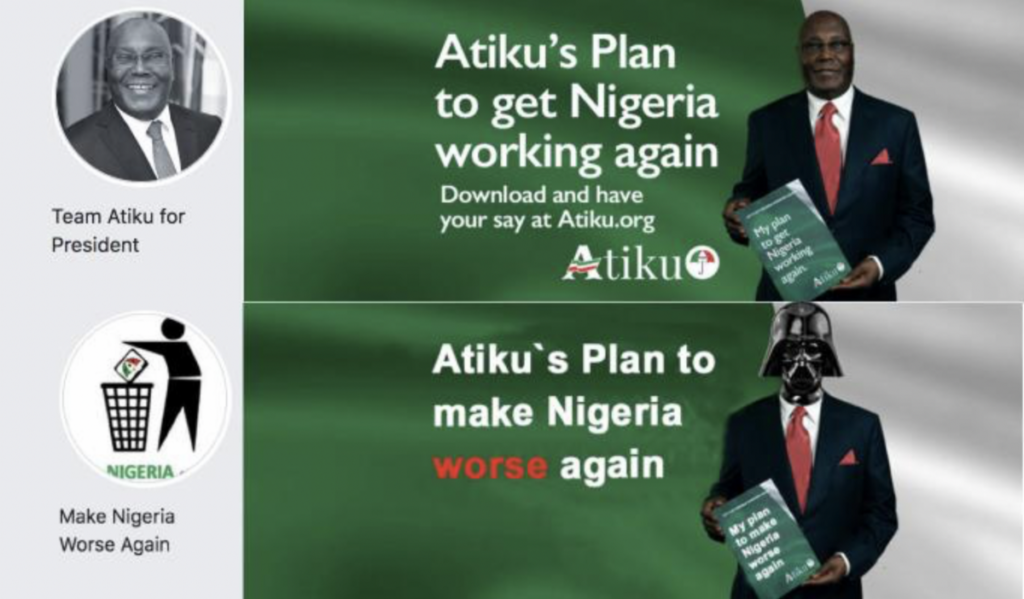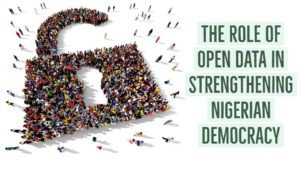
DFRLab
Facebook is under fire in Africa for undermining democracy, with critics saying the social media giant has allowed its platform to be weaponised for co-ordinated misinformation campaigns, the BBC reports, citing a review by US-based political think tank The Atlantic Council’s Digital Forensic Research Lab (DFRLab):.
One of the pages taken down, “Make Nigeria Worse Again”, appeared to be a trolling campaign aimed at Atiku Abubakar, a former vice-president and President Muhammadu Buhari’s main opponent. “The page included a banner image of Mr Abubakar as Darth Vader, the notorious Star Wars villain,” the researchers wrote…. Idayat Hassan, from the Abuja-based Centre for Democracy and Development, told the BBC it was difficult to track who had commissioned the pages as during elections “there’s always a will to try and sway people along either religious or ethnic lines”.
 Transparent, accessible, and credible data has emerged as a key tool for safeguarding the integrity of Nigeria’s democracy against conflict, corruption, and abuses of power. Data empowers civil society, journalists, and citizens to hold power-holders accountable and to expose and address corruption. Data equips government to make policy by providing foundational information about the Nigerian population and its needs.
Transparent, accessible, and credible data has emerged as a key tool for safeguarding the integrity of Nigeria’s democracy against conflict, corruption, and abuses of power. Data empowers civil society, journalists, and citizens to hold power-holders accountable and to expose and address corruption. Data equips government to make policy by providing foundational information about the Nigerian population and its needs.
Data improves Nigeria’s information space, countering disinformation and enhancing the quality of reporting. Yet, data has not been used to its full potential in Nigeria. Though the government is increasingly releasing data to the public, it is often inaccessible and difficult to understand. Further, lack of capacity and political will has hindered robust data collection on critical issues.
In a forthcoming presentation, Mr. Joshua Olufemi will highlight both the progress and persistent challenges in leveraging data for good governance and political accountability. He also will provide recommendations for how to address these challenges and expand the use of data for democracy in Nigeria. Comments by Mr. Christopher O’Connor will follow. Moderated by Melissa Aten, Senior Program Officer, International Forum for Democratic Studies, National Endowment for Democracy.
Tuesday, June 11, 2019. 2:00 p.m.–3:30 p.m.
1025 F Street, N.W., Suite 800, Washington, D.C. 20004
Telephone: 202-378-9675 RSVP
 Joshua Olufemi (left) is a media innovation and development executive with ten years of experience in investigative journalism, open data advocacy, civic innovation, and media development in Nigeria. Currently the head of knowledge and innovation at Premium Times and Program Director at the Premium Times Centre for Investigative Journalism (PTCIJ) in Abuja, he has trained over 300 journalists across Nigeria on data-driven journalism and has managed more than eight accountability and governance projects on a range of issues, including election monitoring, public procurement, health, and press freedom. He contributes to an online open contracting platform called Budeshi, which makes data on government budgets and public services accessible to the public. …. Olufemi plans to develop a data journalism platform called DataPhyte, with the purpose of providing citizens with access to data and analysis on the governance of Nigeria’s oil, gas, and health sectors.
Joshua Olufemi (left) is a media innovation and development executive with ten years of experience in investigative journalism, open data advocacy, civic innovation, and media development in Nigeria. Currently the head of knowledge and innovation at Premium Times and Program Director at the Premium Times Centre for Investigative Journalism (PTCIJ) in Abuja, he has trained over 300 journalists across Nigeria on data-driven journalism and has managed more than eight accountability and governance projects on a range of issues, including election monitoring, public procurement, health, and press freedom. He contributes to an online open contracting platform called Budeshi, which makes data on government budgets and public services accessible to the public. …. Olufemi plans to develop a data journalism platform called DataPhyte, with the purpose of providing citizens with access to data and analysis on the governance of Nigeria’s oil, gas, and health sectors.







